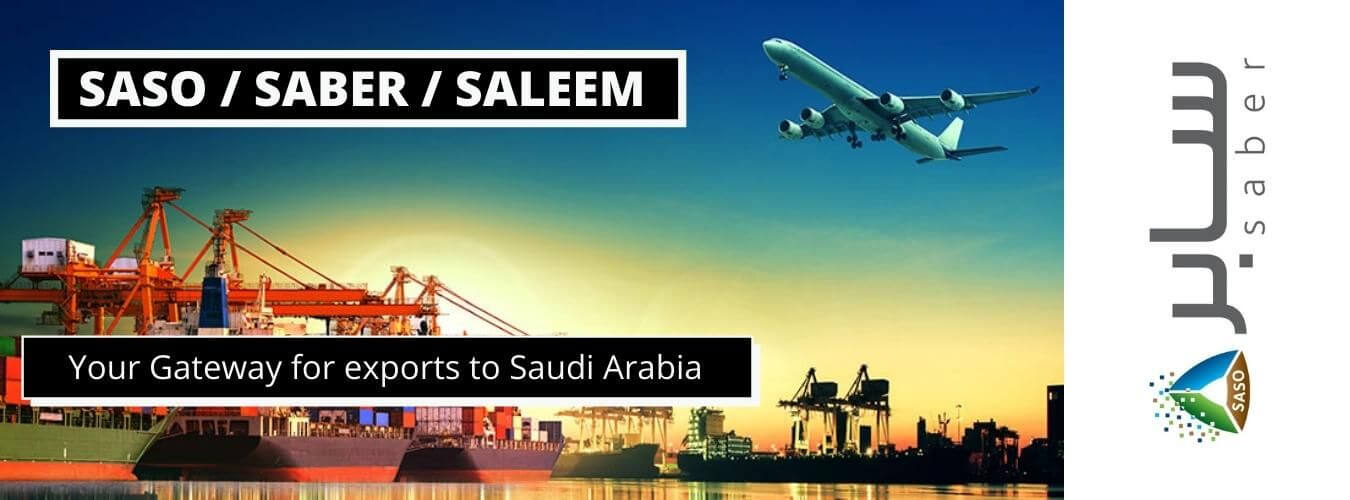
For any product to be exported to the Kingdom of Saudi Arabia (KSA), a crucial requirement is the SABER Certificate, also known as the Certificate of Conformity (CoC). This document, mandated under the SASO Technical Regulations, must accompany all consignments entering the Saudi market. The SABER Certificate ensures that products comply with the national safety, quality, and technical standards required by Saudi Customs.
The Saudi Standards, Metrology and Quality Organization (SASO), the authority responsible for regulating product conformity and market surveillance, has implemented strict guidelines for the SABER system. SASO works closely with Conformity Assessment Bodies (CABs) to verify compliance before products enter Saudi Arabia.
This article explains the SABER Certificate requirement for exporting products to Saudi Arabia, including its purpose, process, and compliance importance.
What is the SABER Certificate?
The SABER Certificate is a mandatory conformity document required by SASO for all regulated products exported to Saudi Arabia. Issued through the official SABER Platform, it ensures that your product meets the country’s stringent safety, quality, and technical compliance criteria based on SASO Technical Regulations and, where applicable, GSO (Gulf Standards Organization) standards.
The process includes issuing a Product Certificate of Conformity (PCoC) for product approval and a Shipment Certificate of Conformity (SCoC) for each consignment. This verification is essential before your goods are shipped to Saudi Arabia.
Why is the SABER Certificate Important?
Saudi Arabia maintains high regulatory standards for all imported products. The SABER Certificate serves several critical functions:
Pre-Shipment Verification
Compliance with Saudi Regulations
Market Access
The SABER Certificate provides pre-shipment approval confirming that your product meets Saudi safety and quality requirements. This step is crucial for maintaining compliance and ensuring smooth Saudi Customs Clearance.
Products will not be allowed into the Saudi market without the required SABER documentation. These documents must be presented to Saudi customs officials to clear goods at the border or port. Non-compliance may lead to long delays, fines, or rejection of the shipment under KSA import regulations.
By obtaining the SABER Certificate, exporters ensure their products can legally enter and be sold in Saudi Arabia. This certificate is a key part of any export plan, enabling entry into a high-potential and heavily regulated market.
How to Obtain the SABER Certificate
Obtaining the SABER Certificate involves the following steps:
Product Registration
Testing and Certification
Submission to SASO
Your product must be registered on the official SABER Platform, providing accurate product details in accordance with relevant SASO Technical Regulations. Many exporters rely on SABER Certificate assistance to complete this registration smoothly and ensure all required information meets Saudi compliance standards.
Depending on the product category, testing may be required by a SASO-approved Conformity Assessment Body (CAB) or a Saudi-recognized laboratory. Once compliance is confirmed, the Product Certificate of Conformity (PCoC) is issued.
After the product has been approved, the final test report is uploaded to the SABER system. SASO will then issue the Shipment Certificate of Conformity (SCoC), which must accompany the product during shipping.
Consequences of Non-Compliance
Failure to obtain the SABER Certificate can lead to serious consequences. Without it, products cannot clear Saudi Customs, resulting in delays, penalties, refusal of entry, or a complete shipment ban. Non-compliance may also affect future import approvals under SASO’s strict market surveillance rules.
Conclusion
The SABER Certificate is an essential requirement for exporting products to Saudi Arabia. It ensures compliance with SASO Technical Regulations, supports safe and reliable trade, and enables successful entry into the Saudi market. By following the correct steps for registration, testing, and certification through the SABER Platform, exporters can avoid delays, meet regulatory obligations, and ensure smooth customs clearance.
FAQ's
Without a SABER Certificate, Saudi Customs will not clear your goods, causing delays, penalties, or shipment rejection under SASO Technical Regulations.
Register your product on the SABER Platform by entering accurate details and ensuring compliance with SASO Technical Regulations and applicable standards.
Yes, all regulated products exported to Saudi Arabia require a SABER Certificate to meet SASO safety, quality, and technical compliance requirements.
Processing time depends on product type and required testing by approved Conformity Assessment Bodies; starting early ensures smooth Saudi Customs clearance.
You can apply directly through the SABER Platform, but many exporters use experienced agents to manage PCoC and SCoC documentation for faster approval.
